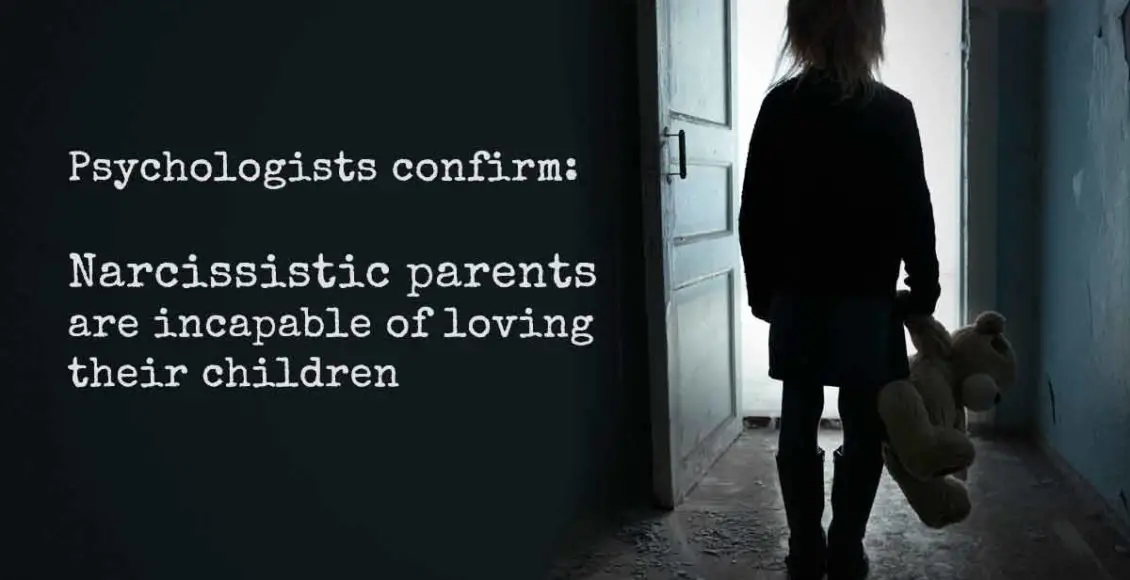A parents love is vital to the healthy development of a child, but recent studies confirm that narcissists are incapable of loving anyone, even their own children.
When a child grows up with narcissistic parents, they never full experience love.
The Mayo Clinic defines narcissistic personality disorder as “a mental disorder in which people have an inflated sense of their own importance, a deep need for admiration and a lack of empathy for others. But behind this mask of ultraconfidence lies a fragile self-esteem that’s vulnerable to the slightest criticism.”
What this lack of empathy contributes to is rather tragic.
Because a narcissist is incapable of feeling genuine empathy, they are incapable of truly loving another person. Unfortunately, this doesn’t change even if they become a parent.
Normally, parents have an instinct to protect their child, and encourage their growth. However, in the case with a narcissistic parent, they see their child as a tool or a trophy- not as a separate entity worthy of love and adoration.
Perpetua Neo, a psychologist and therapist who specializes in people with these personality traits told The Independent,
“[Narcissists] tend to see children as an extension of themselves and a possession. So rather than saying, ‘I’m going to nurture you so you can grow up to be the amazing person you’re meant to be,’ [they say,] ‘You’re supposed to grow up and do this so that you’re my trophy.'”
This contributes to children growing up without a sense of self.
In other words, they never really figure out who they are until far into adulthood. Most kids have some kind of personal space, and there are healthy boundaries in place. However, this is not the case when growing up with a narcissistic parent.
“‘I can check your phone. I can do anything I want to do. I can just barge into your room, basically not respecting your sense of property,'” Neo told The Independent. “There are no emotional boundaries either. So the children grow up not really sure about what boundaries are.”
Imagine growing up and not knowing who you really are, or what makes you happy. When you have a parent like this in your life, you never get to experience what a childhood is actually like. You are constantly trying to please someone who either sees you as “worthy” or “worthless.”
Dr. Elinor Greenberg reports in Psychology Today, ” As their feelings shift, their view of their child shifts as well. Narcissistic parents also see themselves in this limited and binary way: Either they are special, unique and perfect or they are worthless, defective garbage.”
Growing up with a narcissist as a parent teaches the child that their number one goal should be to please their mother/father, regardless if it is at their own detriment. Keeping the parent happy means a more peaceful environment for the child- at least temporarily.
As children grow up, they display more confidence and more bravery. They start to challenge and ask questions. Parents with NPD see this independence as an act of defiance and consider it to be a direct threat to the control they need over their lives.
Psychotherapist Michelle Piper writes that narcissistic parents often hate the idea of their children growing up and want to keep them from doing so as long as possible to “keep stroking their thirsty but fragile egos.”
Narcissistic parents never allow their children to be kids, and never allow them to fully grow up.
These parents keep their children in limbo between whatever expectations they currently have and the ones they may have in the future. It is an impossible way to grow up.
Often, those who were raised by these kinds of parents fear turning into them.
Instead what usually ends up happening is the “compliance response.” This is where someone becomes comfortable with putting their needs aside and bends over backward to please everyone they meet.
“Children of narcissists, they tend to be taken over by this compulsion to serve others,” Neo said. “That’s when they become completely empathetic, over-giving, and are used by more narcissists and more dark-triad people in their lives.”
“You may have always associated love and appreciation with conforming to the demands of your parents and therefore assume that is how it all works.”
Many psychologists and experts agree that the only way to handle this kind of relationship is to cut ties, and follow the “no contact” rule.
Stephanie Sarkis PhD writes in Psychology Today, “Let them know that you are done with the relationship, and wish them the best. That’s it. Any other attempt at contact may result in you being “hoovered” back into the relationship. Narcissists are masters at hovering. They tell you exactly what you need to hear, and once you are back in the relationship, things are back to the way they were—except maybe worse.”



